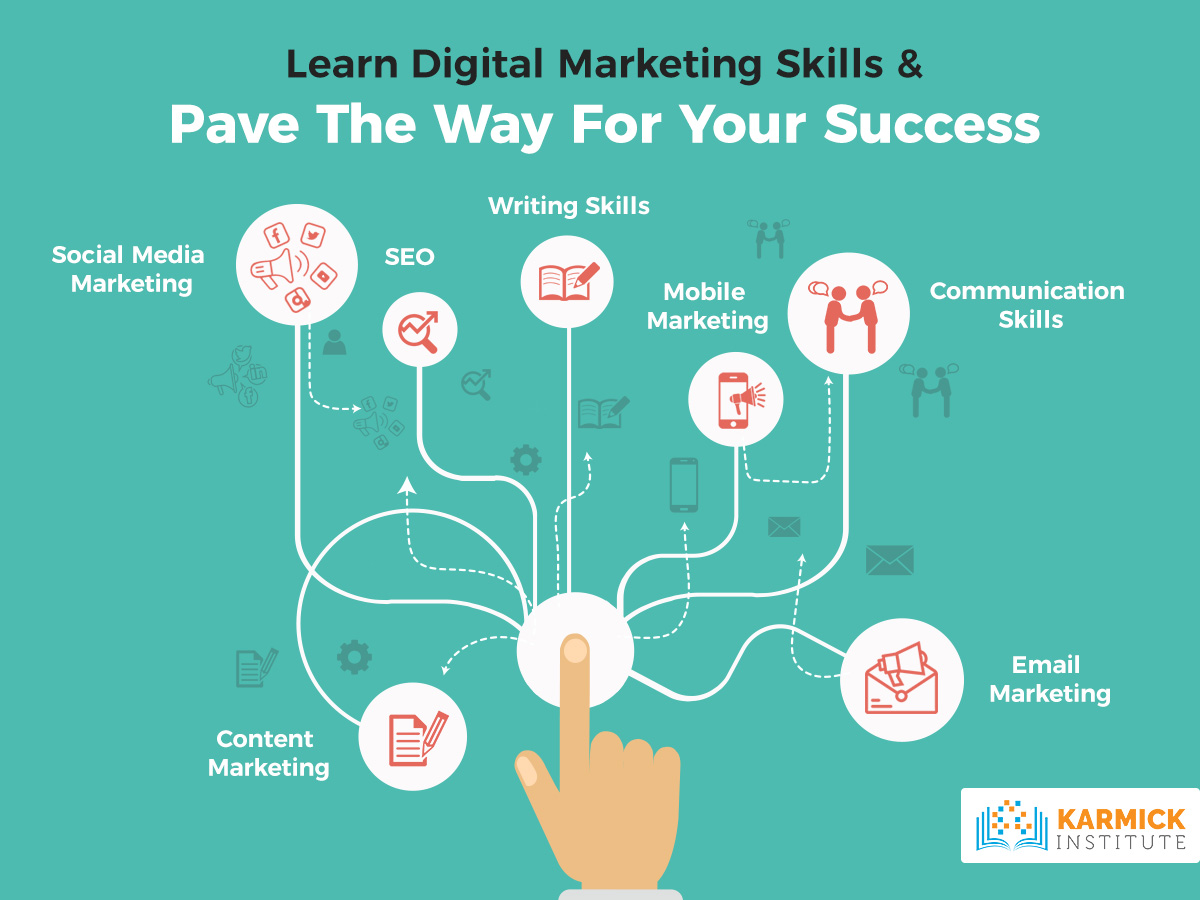Learn Digital Marketing the Right Way
Understanding the ConceptsPermalink
Digital marketing encompasses numerous techniques to promote brands, products, and services online. Some of the key concepts include search engine optimization (SEO), pay-per-click (PPC) advertising, social media marketing (SMM), content marketing, email marketing, affiliate marketing, and more. As a digital marketer, it is important to understand how each method works and how they complement each other to create an effective digital marketing strategy. SEO, for example, helps optimize website content and structure to rank higher organically in search engines. PPC advertising, on the other hand, allows buying targeted keyword ads to appear in search results or social media feeds. While the theoretical concepts of digital marketing can be learned independently through online resources, it is challenging to gain practical, hands-on experience without proper guidance. Taking a course aids in applying the concepts learned and helps fill the knowledge gaps.

Choosing a Course Over Self-StudyPermalink
There are many free online resources for learning digital marketing fundamentals, like tutorials on YouTube and educational blogs. However, self-study alone may not equip you with the necessary skills for an entry-level job. A structured course provides systematic classroom training and project-based learning under an instructor’s supervision. This helps build a solid foundation. Formal digital marketing certification has also become an industry standard, with programs offered by Google, HubSpot, and other organizations. Completing a certification carries weight among employers and establishes credibility. Coursework often includes assignments, quizzes, and capstone projects to gain experience across different specializations like SEO, PPC, analytics, and more. Many training providers offer a blended model with both online self-paced modules and live virtual classes. This balanced approach allows learning at your own pace while still benefiting from peer interactions and real-time mentoring. Internship opportunities are also available through partner companies upon course completion.
Choosing a Reputed Training ProviderPermalink
With the growing demand for digital marketers, the ed-tech industry has responded with countless online learning offerings of variable quality. It is important to vet potential training providers carefully to ensure a worthwhile learning experience. Reputed brands with a proven track record tend to have more qualified instructors and up-to-date curriculums reflecting industry trends. Look for programs accredited by recognized bodies. Student reviews and placements can provide useful insights into teaching standards and career support. Cost-effectiveness is another factor. While inexpensive or free courses may seem attractive, investing in a comprehensive program from an experienced provider pays off in the long run through better learning outcomes and career prospects. Sample classes and interaction with alumni can help decide if a particular institution is a good fit.
Leveraging Online ResourcesPermalink
Even after opting for an organized course, independent learning plays a key supporting role. Individuals passionate about digital marketing continue enhancing their skills through additional self-study and certification. A wealth of free and low-cost material exists online. YouTube hosts a treasure trove of tutorial videos by leading practitioners, covering everything from foundational SEO techniques to advanced PPC strategies. Google’s Digital Garage and Facebook Blueprint platforms offer free, role-based courses in partnership with coursera. HubSpot Academy provides certifications in inbound methodology. Following discussions on industry forums gives exposure to emerging best practices. Curating relevant content on your blog or social profiles develops an online learning portfolio and personal brand. Participating in hackathons and code competitions is a fun way to hone technical abilities outside of formal education. Lifelong learning through constant experimentation and education keeps one’s digital marketing expertise relevant and competitive. With dedication and the right combination of structured and independent study, success in this dynamic field is very much achievable.
Consider Starting with Affiliate MarketingPermalink
For individuals still unsure about a specific digital marketing role, affiliate marketing presents a low-risk entry point. As an affiliate, one does not require website development or product ownership. The focus is simply on driving traffic to promoted programs and earning commissions. Popular affiliate platforms like Clickbank and JVzoo allow browsing their marketplaces filled with digital products spanning various niches. These range from ebooks and online courses to SaaS tools. Getting set up is free and involves signing up, choosing quality products to promote, and integrating provided affiliate links and banners on blogs, social profiles, landing pages, or emails. SEO, content marketing, and social media engagement become useful skills for ranking higher in search results and getting noticed organically when promoting affiliate offers. Basic analytics helps optimize campaigns and maximize earnings over time. There are also affiliate networks for physical products available on sites like Amazon. This offers a low-risk way of gaining exposure to different revenue models and understanding what resonates before specializing in any one particular digital marketing role. Positive customer reviews and recurring commissions indicate an aptitude worthy of professional pursuit.
Gaining Experience Through InternshipsPermalink
To kickstart a career, gaining applied experience through relevant internships is invaluable. Most digital marketing courses arrange industry internships lasting 3-6 months as part of the curriculum or upon completion.
This provides hands-on learning of real-world responsibilities under expert mentors, beyond what is possible within the confines of a classroom. From optimizing campaigns and creating digital assets to managing social profiles and reporting analytics, internships offer exposure to end-to-end project work.
Leading the projects independently with feedback cultivates crucial soft skills like time management, team collaboration, client communication and more. Such on-the-job exposure makes graduates highly employable in entry-level analyst or coordinator roles and helps negotiate better salaries.
Some internships even transition into full-time job opportunities post completion. Maintaining a portfolio of achievements demonstrates passion and abilities to potential employers. Supplementing internship experiences with freelance consulting projects on platforms such as Upwork adds practical qualifications.
This well-rounded education comprising formal training, self-study and application helps kickstart a fruitful career in the fast-evolving digital marketing domain. Staying updated on emerging trends ensures long-term career success.

